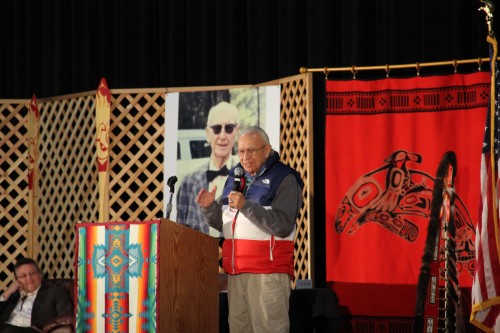
By Andrew Gobin, Tulalip News
When do your rights expire? When do the terms of treaties cease? Never. The Boldt Decision sought to resolve these questions. In 1970, at the height of tensions between Puget Sound tribes and the State of Washington, the United States on behalf of the tribes filed suit against the State of Washington for violating the tribes’ treaties. More than three years later Judge George H. Boldt, who heard U.S. v. Washington and for whom the decision is named, handed down his decision in favor of the tribes, reaffirming the treaties and rights secured to Indians therein. Forty years later, tribal leaders from Puget Sound tribes, activists, and other notable people involved in the battle for Treaty Indian fishing rights gathered February 5th and 6th in Squaxin Island to remember the fight to protect their right, to discuss the importance of the Boldt Decision and all that it accomplished, and to reaffirm the commitment to continue the fight.
In the 1950s and 1960s, the State of Washington began filing injunctions, blocking Indian fisheries in the name of conservation. Indian people throughout the Puget Sound, though, continued to fish, practicing their culture and feeding their families, risking arrest and violence from state law enforcement.
Billy Frank Jr., Nisqually elder and prominent figure throughout the Boldt Decision, said, “We came down to the river, and they [the cops] had confiscated everything. ‘Where are our nets? Our boats?’ I thought. ‘How are we supposed to feed our families?’”
“We had to fish at night, which was dangerous. But we had to fish at night because it was illegal. What could we do? It was our way of life, we couldn’t stop,” recalled Hank Adams, a Native American activist from the Assiniboine Sioux tribe. Adams fished with Billy Frank and his family on the Nisqually River.
Frank championed the fight for treaty rights, with many leaders at that time rallied behind him and his family. Their traditional fishing grounds, Frank’s Landing, became ground zero in the battle for Treaty Indian fishing. Frank’s Landing played host to many fish-ins in protest of the injunctions, which gained national attention. Tribal leaders were joined at fish-ins by members of AIM (The American Indian Movement) and celebrities, such as renowned stage and screen actor, Marlon Brando. Most fish-ins ended in mass arrests. One famous photograph shows Brando packing two salmon up the bank at Frank’s Landing, only to be arrested with other participants.
Puyallup Elder and fisherwoman, Ramona Bennet, recalls being arrested on several occasions.
“They heard we were fishing, and the pigs [cops] come down to arrest us. Women, children, men, they didn’t care, they arrested all of us, whole families. One of the pigs went over to my mom, knee deep in fish in the back of a pickup. She told them, ‘You want my fish? HERE!’ and she picked up a fish and slapped that pig upside the head.”
Because of the tensions at Frank’s Landing, not every fish-in ended in arrest. Hank Adams remembers how nervous Thurston County Sheriffs were, not wanting to escalate the dispute.
“One day we were fishing, and Billy went up the [Nisqually] river to check the net. The Sheriffs launched two air boats at the rail bridge upriver and were comin’ for Billy. I was at his sister’s place. He come tearin’ down the river shouting, ‘Get the gun!’ So I grabbed the rifle and headed out the door. I ran down the bank and came to a clearing and ran into some other law enforcement. There was an old burnt out car, so I ran and jumped down behind it. I used my army training and used the butt of the rifle to break my fall, and when I did that the rifle went off. At the same time my hand slipped off the butt of the gun and hit what Billy tells as a broken beer bottle, but it was a Pepsi bottle. So I cut my hand on the neck of that Pepsi bottle and was bleeding everywhere. But when that gun went off, the guys in those airboats hit the deck and flew right on past Billy, and he hit the bank and was unloading his fish. Next thing we know, there’s about 30 Thurston County Sheriffs cars and some state troopers pulled up, guns drawn, and the chief jumps out in front and says, ‘Hold your fire, put your guns down, everyone just calm down.’ He come over and looked at me and my hand, ‘Come on over here I got a first aid kit in the truck,’ he said. He got me all bandaged up, the bandages were all bloody, it really just looked terrible. The newspapers the next day said, ‘Mystery surrounds evening events at Frank’s Landing. No arrests were made, though Native Activist Hank Adams sustained some sort of injury.’”
These encounters happened on a daily basis, as the state held their injunctions to be valid, and acted accordingly. Tribal families experienced hardships as heads of household were jailed repeatedly. The tribes stood firm on the treaty, fighting to protect their fishing rights, and ultimately their sovereignty.
Frank said, “Who do I go to? Do I go to the governor? Do I go to the congress? Nobody listens…oh you’re all just Indians.”
In 1970, with the state continuously challenged by the tribes, the United States as the trustee of the tribes filed suit against Washington in Federal District court, Judge George H. Boldt was assigned to the case.
Members of Judge Boldt’s family attended the celebration and were honored for his memory. His daughter, Virginia Riedinger, had this to say.
“My father grew up in Chicago with nothing but the American dream. His father moved them to Montana where he finished high school. He put himself through college, and graduated with a law degree from the University of Montana in 1926. After practicing law for more than 15 years, he enlisted to serve this country in WWII at an age that was unheard of, especially as a volunteer. When he returned he became a trial lawyer in Tacoma Washington, and was later appointed by President Eisenhower as the Federal District Court Judge in 1953, where he spent more than 25 years on the bench.
As a judge, my father held true to the laws of this country. He believed in the law, and was known for his hard decisions and expedited court processes. He often was recruited to assist in other courts across the nation that were backlogged with cases. One thing was constant, my father always did what he knew was right and I never knew him to look back with regret or doubt.”
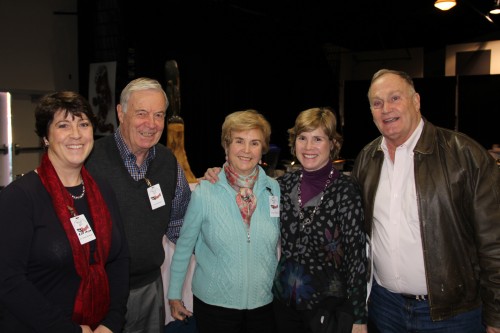
As the case continued, and later was decided, Judge Boldt and his family were subjected to vicious public attacks on his reputation. A photo displayed throughout the celebration captured a burning effigy of the Judge, strung up in a tree outside the District Courthouse, all wrapped up, presumably, in an Indian fishing net. Even so, Boldt remained undeterred in his will to uphold the law.
For more than three years the case went on, hearing from both sides. The case was rather unique in some aspects, as the question of fishing rights had not been previously understood from a legal perspective. There was limited legal precedent that reaffirmed the treaties and preempted state laws. For this case, the information had to be more in depth. Charles Wilkinson, a law professor at the University of Colorado and well-known legal scholar, gave a powerful speech about the Boldt Decision.
“Judge Boldt, ruling on the basis of justice in its most luminous dimensions rather than on the strenuous hearsay and other technical objections of the state’s attorneys, accepted the elders’ testimony into evidence and listened raptly.
Ask people who saw all or most of that trial, and they will tell you that the elders’ testimony brought the whole story together. Judge Boldt had worked hard and open-mindedly on this case and, by the time the elders took the stand, he had acquired an expansive knowledge of Indian law, and all the testimony already heard may have caused him to have his final ruling in mind. But the straightforward, utterly authentic words and bearing of the traditional Native people made his decision of February 12, 1974 inevitable.”
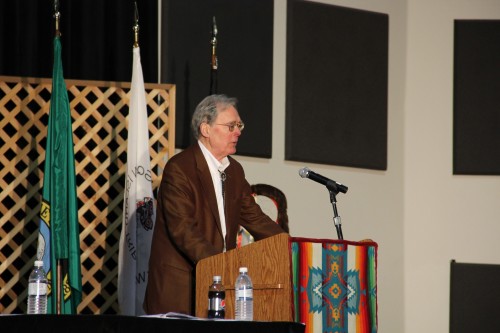
Relying on testimony of the elders, along with the vast ethnographic work of scholars, such as Dr. Barbara Lane, who were called as expert witnesses, Judge Boldt looked critically at the language of the treaty. He handed down his decision in 1974 in favor of the tribes, holding the United States accountable to the promises of the Stevens Treaties of the Washington Territory, including the Treaty of Point Elliot, the Treaty of Point No Point, and the Treaty of Medicine Creek.
What did the decision mean? Was it truly a victory? At the time, not all tribal people saw it as such.
“I cried when I heard the decision. ‘We lost half our fish!’ I yelled,” said Bennet.
Others saw it as a great victory, for Washington tribes, for fishing, and treaty rights, and for tribes across the nation. The decision reaffirmed the treaties and recognized the sovereignty of tribes.
Wilkinson said, “Make no mistake about it: the transcendent contribution of the Boldt Decision was to uphold the treaty rights of the Northwest tribes. But it was also a national case about national commitments and values.”
Because the state refused to act on the decision, continuing attempts to block Indian fisheries, Judge Boldt exercised continuing jurisdiction, rarely used, which maintains the court’s control over decisions, to ensure the decision was implemented. Judge Boldt was committed to upholding the law and his decision, and his continuing jurisdiction is still in effect today.
The fight continues, though today the questions have shifted. What does it mean to have a treaty right to fish? Boldt’s decision recognized tribes as sovereign, and having a shared right to the salmon resource naming them as co-managers and regulators of the resource, but what does that mean? The fight for Treaty Indian fishing was about bringing the past forward, the fight today is about protecting the future of the resource.
Frank said, “We have to protect the salmon. Look at California. The tribes there have the first water right, but there is no water. We have a right to the salmon, but if there are none, what kind of right we got?”
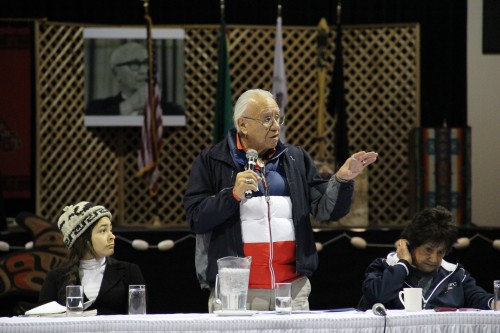
Recently, what’s known as the Culvert Case held the state accountable for making streams in developed areas passable to salmon. The State Fish Consumption Rate, which affects water quality and pollution, says that, on average, citizens consume eight ounces of salmon a month, about the size of one U.S. quarter a day. For Puget Sound tribes, salmon is a staple both in diet and culture. Today, it remains central to tribal economies as it has historically, even pre-contact. If the consumption rate stands, more pollutants would be allowed to go into the water, meaning more salmon die off.
Frank said, “They’re poisoning the water. It’s poisoned. The salmon that come out of the Nisqually River, half of them are dead before they reach the Narrows [in Tacoma].”
The tribes have won the Culvert Case, and continue to work on others.

Throughout the celebration, an empty chair sat near the front. It was a symbol of all the ancestors of the tribes that fished the Puget Sound, as well as those warriors of the Boldt Decision that have passed on; Guy McMinds, Bernie Gobin, Vernon Lane, and Chet Cayou Sr., to name a few. The importance of this chair is immense. It represents the passing of the torch to the younger generation. The celebration of the Boldt Decision was to remind the younger generation about the importance of the treaty, how hard their elders fought to protect it, and how hard they need to continue to fight for the treaty, for their sovereignty, and for their culture.
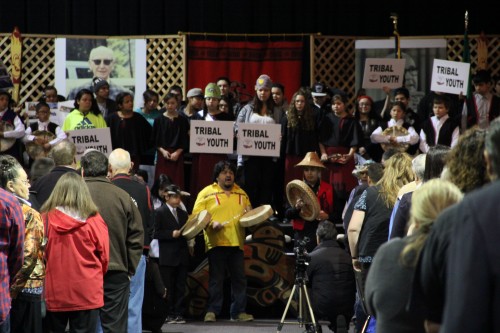
Andrew Gobin is a reporter with the See-Yaht-Sub, a publication of the Tulalip Tribes Communications Department.
Email: agobin@tulaliptribes-nsn.gov
Phone: (360) 716.4188
